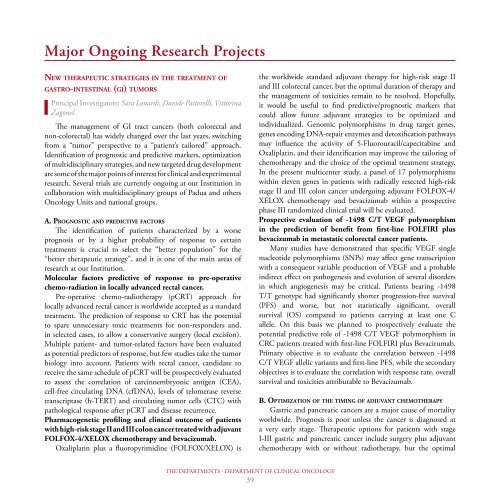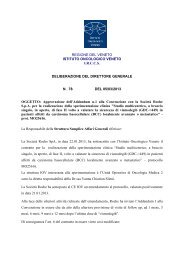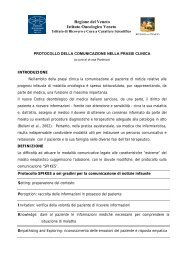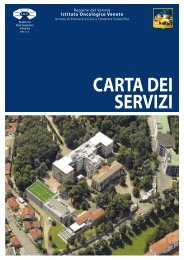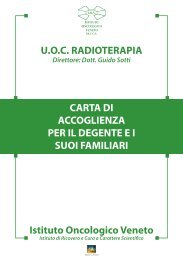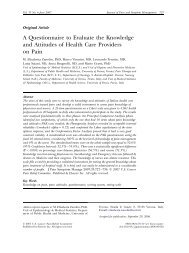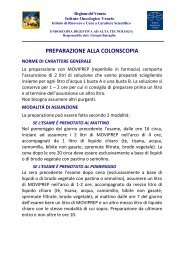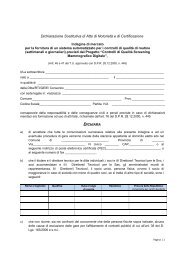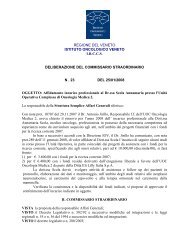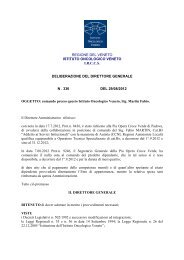SCIENTIFIC REPORT 2010 - 2011 - IOV
SCIENTIFIC REPORT 2010 - 2011 - IOV
SCIENTIFIC REPORT 2010 - 2011 - IOV
Create successful ePaper yourself
Turn your PDF publications into a flip-book with our unique Google optimized e-Paper software.
Major Ongoing Research Projects<br />
NEw ThErapEuTiC STraTEGiES iN ThE TrEaTmENT Of<br />
GaSTrO-iNTESTiNal (Gi) TumOrS<br />
Principal Investigators: Sara Lonardi, Davide Pastorelli, Vittorina<br />
Zagonel<br />
The management of GI tract cancers (both colorectal and<br />
non-colorectal) has widely changed over the last years, switching<br />
from a “tumor” perspective to a “patient’s tailored” approach.<br />
Identification of prognostic and predictive markers, optimization<br />
of multidisciplinary strategies, and new targeted drug development<br />
are some of the major points of interest for clinical and experimental<br />
research. Several trials are currently ongoing at our Institution in<br />
collaboration with multidisciplinary groups of Padua and others<br />
Oncology Units and national groups.<br />
A. prOGNOSTiC aND prEDiCTivE faCTOrS<br />
The identification of patients characterized by a worse<br />
prognosis or by a higher probability of response to certain<br />
treatments is crucial to select the “better population” for the<br />
“better therapeutic strategy”, and it is one of the main areas of<br />
research at our Institution.<br />
Molecular factors predictive of response to pre-operative<br />
chemo-radiation in locally advanced rectal cancer.<br />
Pre-operative chemo-radiotherapy (pCRT) approach for<br />
locally advanced rectal cancer is worldwide accepted as a standard<br />
treatment. The prediction of response to CRT has the potential<br />
to spare unnecessary toxic treatments for non-responders and,<br />
in selected cases, to allow a conservative surgery (local excision).<br />
Multiple patient- and tumor-related factors have been evaluated<br />
as potential predictors of response, but few studies take the tumor<br />
biology into account. Patients with rectal cancer, candidate to<br />
receive the same schedule of pCRT will be prospectively evaluated<br />
to assess the correlation of carcinoembryonic antigen (CEA),<br />
cell-free circulating DNA (cfDNA), levels of telomerase reverse<br />
transcriptase (h-TERT) and circulating tumor cells (CTC) with<br />
pathological response after pCRT and disease recurrence.<br />
Pharmacogenetic profiling and clinical outcome of patients<br />
with high-risk stage II and III colon cancer treated with adjuvant<br />
FOLFOX-4/XELOX chemotherapy and bevacizumab.<br />
Oxaliplatin plus a fluoropyrimidine (FOLFOX/XELOX) is<br />
THE DEPARTMENTS - DEPARTMENT OF CLINICAL ONCOLOGY<br />
39<br />
the worldwide standard adjuvant therapy for high-risk stage II<br />
and III colorectal cancer, but the optimal duration of therapy and<br />
the management of toxicities remain to be resolved. Hopefully,<br />
it would be useful to find predictive/prognostic markers that<br />
could allow future adjuvant strategies to be optimized and<br />
individualized. Genomic polymorphisms in drug target genes,<br />
genes encoding DNA-repair enzymes and detoxification pathways<br />
may influence the activity of 5-Fluorouracil/capecitabine and<br />
Oxaliplatin, and their identification may improve the tailoring of<br />
chemotherapy and the choice of the optimal treatment strategy.<br />
In the present multicenter study, a panel of 17 polymorphisms<br />
within eleven genes in patients with radically resected high-risk<br />
stage II and III colon cancer undergoing adjuvant FOLFOX-4/<br />
XELOX chemotherapy and bevacizumab within a prospective<br />
phase III randomized clinical trial will be evaluated.<br />
Prospective evaluation of -1498 C/T VEGF polymorphism<br />
in the prediction of benefit from first-line FOLFIRI plus<br />
bevacizumab in metastatic colorectal cancer patients.<br />
Many studies have demonstrated that specific VEGF single<br />
nucleotide polymorphisms (SNPs) may affect gene transcription<br />
with a consequent variable production of VEGF and a probable<br />
indirect effect on pathogenesis and evolution of several disorders<br />
in which angiogenesis may be critical. Patients bearing -1498<br />
T/T genotype had significantly shorter progression-free survival<br />
(PFS) and worse, but not statistically significant, overall<br />
survival (OS) compared to patients carrying at least one C<br />
allele. On this basis we planned to prospectively evaluate the<br />
potential predictive role of -1498 C/T VEGF polymorphism in<br />
CRC patients treated with first-line FOLFIRI plus Bevacirumab.<br />
Primary objective is to evaluate the correlation between -1498<br />
C/T VEGF allelic variants and first-line PFS, while the secondary<br />
objectives is to evaluate the correlation with response rate, overall<br />
survival and toxicities attributable to Bevacizumab.<br />
B. OpTimizaTiON Of ThE TimiNG Of aDiuvaNT ChEmOThErapy<br />
Gastric and pancreatic cancers are a major cause of mortality<br />
worldwide. Prognosis is poor unless the cancer is diagnosed at<br />
a very early stage. Therapeutic options for patients with stage<br />
I-III gastric and pancreatic cancer include surgery plus adjuvant<br />
chemotherapy with or without radiotherapy, but the optimal


